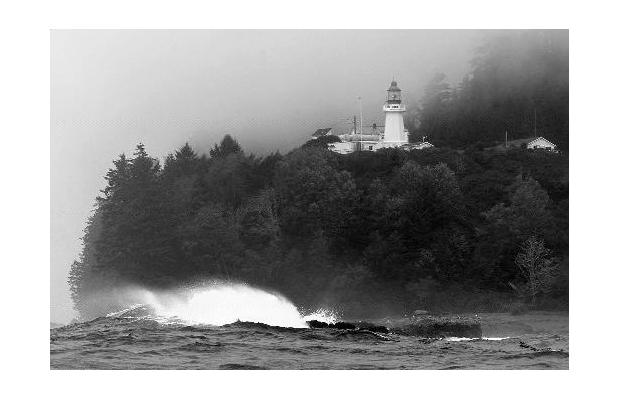 Feds' lighthouse sell-off program hits dark patch
Feds' lighthouse sell-off program hits dark patch
The lighthouse at Carmanah Point, southeast of Bamfield along the West Coast Trail, is one of the few remaining staffed lighthouses in B.C. Letter-writers say manned lighthouses have a long history of providing aid to mariners in trouble.
Photograph by: Darren Stone, Times Colonist, Times Colonist
OTTAWA: The federal government has been preparing to sell almost 1,000 lighthouses peppered across the country.
But many of those beacons aren't the government's to sell, says the group overseeing operations on an island in British Columbia where one of those lighthouses sits.
At issue is who holds the rights to the land : the respective provinces or the federal government.
The lighthouse at Race Rocks is located one nautical mile below the southernmost tip of Vancouver Island, and was built by the Royal Navy in 1860.
It has been listed as "for sale" since June, when the government designated it and the others as surplus property.
The light tower which harbours an automated light and a foghorn stands on a small rock within an island that is part of a provincial ecological reserve.
And while the tower itself is owned and operated by the Canadian Coast Guard, the land on which it sits is not federal property, a spokesman for the province said Thursday.
"The land occupied by the lighthouse on Race Rocks is provincial land, which is under a transfer, or lease, to the federal government for lighthouse purposes," said Dan Gilmour, a spokesman for B.C.'s environment ministry.
In a letter sent to the team at Race Rocks shortly after the lighthouse was designated surplus property, Gilmour's colleague, Doug Bifffard said he had received notice from the federal government indicating it was aware of the quandary.
"The Department of Fisheries and Oceans and the Coast Guard know that they cannot enter into any arrangement to sell, lease or otherwise tenure out, most of the lighthouses in B.C. because the land is under provincial ownership," the letter said.
Last summer, the federal Fisheries Department published a catalogue of 975 surplus properties following the coast guard's assessment of all the lighthouses it operates.
The list contains at least one from every province except Saskatchewan, and includes some iconic structures, such as those at Peggy's Cove, N.S. and Cape Spear, near St. John's, N.L.
To save the lighthouses listed as surplus, a community or group must agree to take on the maintenance of the site, but the federal government would continue to operate and maintain the lighthouse, itself.
The government took some heat for the move when the listing became public in June. Many groups said it undermined the Heritage Lighthouse Protection Act, which had come into force days earlier, at the end of May.
The act was designed to ensure the federal government preserved historically significant lighthouses, rather than leaving them abandoned and left to crumble.
Those feelings are being echoed by the chair of the Senate committee on fisheries and oceans, Liberal Senator Bill Rompkey of Newfoundland and Labrador.
"We were disappointed and surprised that the coast guard had made so many lighthouses surplus," he said. "It really defeats the purpose of the act."
The committee this week released the first of two reports it is issuing as part of its wide-reaching study of Canadian lighthouses.
The second report, set to be released this spring, will focus on the heritage aspect of the country's lighthouses, Rompkey said.
One issue the committee will examine closely is how much time a community group has to assume responsibility of any given lighthouse, Rompkey said. As it stands, groups have two years from the day the act came into force.
"We feel they really should revisit that part, at least," he said.
When the committee was touring the country and hosting discussions on the future of lighthouses, it heard from some of the stakeholders at Race Rock, including Garry Fletcher, BC Parks Ecological reserve warden.
"In my opinion, it would of course, defy logic to see how the federal government could sell a property owned by the province," he said. "And we conveyed this sentiment when we attended the Senate meetings in Victoria."
© Copyright (c) Postmedia News